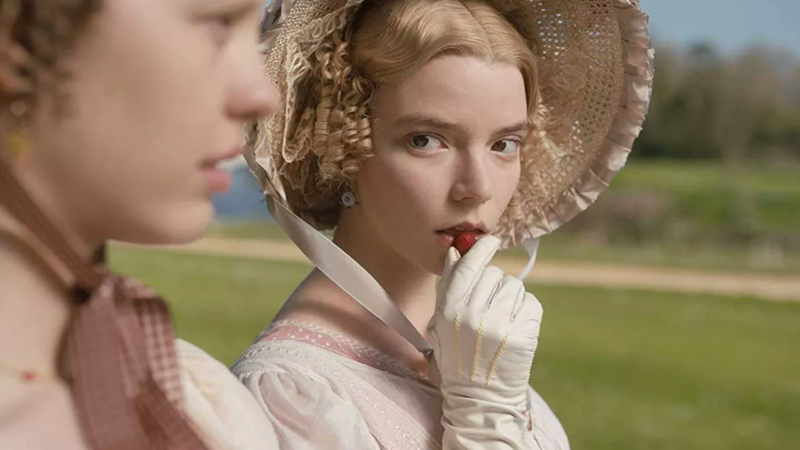Review: Emma
Anya Taylor-Joy in a lively renovation of Jane Austen’s classic novel.

Emma. is a movie so deliciously detailed you want to step inside of it and wander around, marveling at its snazzy furnishings—the bonnets and capes and ankle-length greatcoats, the candle-lit banquet tables crowded with roasts and cakes, the vast country manor with its cavernous rooms and sweeping greensward. The picture is a celebration of costume design and set decoration, swooningly orchestrated by first-time director Autumn de Wilde, who at age 49, after a long career in photography and music videos (Raconteurs, Beck), has fully emerged as a feature filmmaker.
In bringing this latest adaptation of Jane Austen's 1815 novel to the screen (it was also the model for the 1995 Clueless), the American Wilde is greatly assisted by an appropriately English cast. Anya Taylor-Joy (Thoroughbreds), with her pillowy lips and faintly extraterrestrial presence, is bitingly funny as Emma Woodhouse, the 20-year-old heiress with an interest in matchmaking; and Mia Goth (High Life) is a perfect foil as the lovably befuddled Harriet Smith, Emma's latest romantic project. Orbiting around these two are the smirky vicar Mr. Elton (Josh O'Connor), whom Emma wants to pair up with Harriet; the attractively tousled George Knightley (Johnny Flynn), who would seem just the man for Emma herself, except that he finds her enormously annoying; the chatty spinster Miss Bates (wonderfully played by Miranda Hart); and Emma's dotty father (Bill Nighy, even better than usual).
Several other characters also turn up, naturally bearing narrative complications. Early on, Harriet, an orphan of unknown provenance, receives a proposal of marriage from a good-hearted farmer, Mr. Martin (Connor Swindells); Emma, however, tells her she must aim higher. Jane Fairfax (Amber Anderson), a young woman of Emma's age and long an object of her jealous resentment, arrives to demonstrate her superiority as a drawing room pianist. And an excitingly eligible young heir named Frank Churchill (Callum Turner) pops up bearing a most unexpected secret.
Like the romcoms of our own day, Emma (I say we ignore the period at the end of the title) holds few surprises apart from the question of who will end up with whom on the way to a happy ending. But given the Regency setting, social observations naturally arise. Most of the main characters, Emma included, are exceedingly wealthy and essentially indolent, catered to at all times by squads of retainers. We see a man sitting down to enable a servant to save him the trouble of removing his own socks. And we watch as a maidservant stands before Emma, fiddling with her dress, while Emma stands staring past her, barely acknowledging the woman's presence. Director Wilde doesn't belabor any of this, but we also sense the smothering reality of a society in which women required a dowry to attract a suitable mate.
Although Emma Woodhouse is not an especially sympathetic character—she's a brat, basically—Anya Taylor-Joy makes her slyly amusing, delivering juicy line readings without lingering over them. ("I have no thoughts of matrimony at present" is not a sentence that would seem to offer many fruitful possibilities, but Taylor-Joy finds one.) She is also entirely at ease in the movie's gorgeous period clothing, however eccentric. (She plays one scene burdened by a feathered hat the size of a hurdy-gurdy.) It's been five years since this actor's big breakthrough in The Witch, but she's so fresh and inventive here that it feels like she just arrived.
Editor's Note: As of February 29, 2024, commenting privileges on reason.com posts are limited to Reason Plus subscribers. Past commenters are grandfathered in for a temporary period. Subscribe here to preserve your ability to comment. Your Reason Plus subscription also gives you an ad-free version of reason.com, along with full access to the digital edition and archives of Reason magazine. We request that comments be civil and on-topic. We do not moderate or assume any responsibility for comments, which are owned by the readers who post them. Comments do not represent the views of reason.com or Reason Foundation. We reserve the right to delete any comment and ban commenters for any reason at any time. Comments may only be edited within 5 minutes of posting. Report abuses.
Please to post comments


Fussy, indolent, wealthy white people expressing jealous resentment and trying to demonstrate superiority over each other. It's the Democratic primary!
Except the Dem candidates expect the American taxpayers to provide the dowry.
son dakika https://www.habersunum.com/
I am boss of my own will. Come to join under link to earn $75 per hour by watching tv with family in spare time. Earn as much as you spent time. If so please copy the link and full fill your dream......... Read more
I am making $98/hour telecommuting. I never imagined that it was honest to goodness yet my closest companion is acquiring $20 thousand a month by working on the web, that was truly shocking for me, she prescribed me to attempt it. simply give it a shot on the accompanying site.....OPEN THIS MONEY WEBSITE
I made $64,000 so far this year working online and I’m aade such great money. It’s really user friendly and I’m just so happy that I found out full time student. I’m using an online business opportunity I heard about and I’ve mabout it. Here’s what I’ve been doing detail.......Read MoRe
I made $64,000 so far this year working online and I’m aade such great money. It’s really user friendly and I’m just so happy that I found out full time student. I’m using an online business opportunity I heard about and I’ve mabout it. Here’s what I’ve been doing detail........Read MoRe
I especially like the part where they flee from the rectory, seconds before it explodes in a fireball.
What? I'm just trying to make the movie sound interesting to more than one gender.